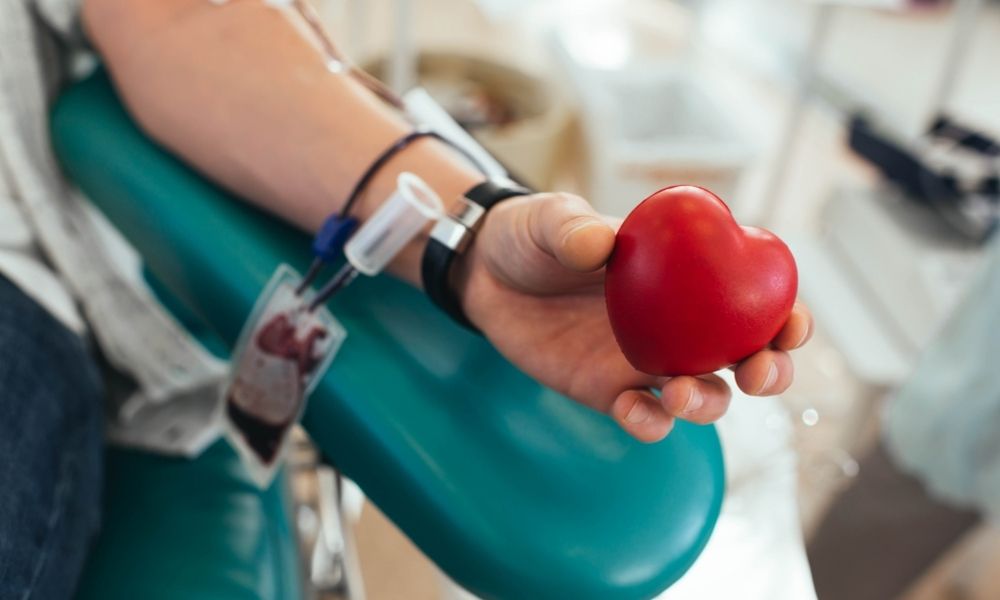Benefits of Donating Blood: Why It Is Good For Your Health

Having lives is one heroic purpose of donating blood. Still, as popularly conversed, it is also one of the most recommended ways to keep your body healthy as it helps lower blood pressure, improve blood flow, and reduce the risk of heart disease.
If you’re new to blood donating, it might come off as an intimidating step involving your health, leaving you with a ton of questions. So before officially deciding to hop on that train to go to the blood bank, keep reading!
Here’s a breakdown of the most important things you need to know about blood donation:
Benefits of Donating Blood
Increases blood flow
Blood donation lowers the viscosity of the blood, which promotes improved blood circulation or lower blood pressure. This lowers the risk of heart attack, stroke, and blood clot formation.
According to a medically supported article by Health Matters, this benefit is especially helpful for men compared to women who naturally and regularly release blood during their menstrual cycles, eradicating the need for donating blood.
Lowers blood iron levels
There exists a hereditary disorder called hemochromatosis which results in an abnormal production of iron in the body. This can be harmful due to the number of side effects it comes with, such as: weakness and lethargy, weight loss., joint pain, abdominal pain, liver dysfunction, sexual dysfunctions, disorders of the menstrual period, such as early menopause, and more.
The good news is that the blood the people with this condition produce is perfectly healthy, which makes them the perfect blood donors for those in need. Blood donation is an easy and effective way of lowering iron levels and relieving the above-mentioned symptoms.
Improves emotional wellbeing
Donating blood is an experience most donors say brings a satisfying sense of fulfillment, joy, and a sense of emotional well-being. It decreases stress and reduces negative feelings as it makes you feel the warmth of being part of a community.
What to do before, during, and after blood donation
Before Donating Blood
Some temporary reactions of blood donation include weakness, dizziness, feeling faint, lightheadedness, nausea, and bleeding under the skin or bruising.
Preparing your body for blood donation is an integral part of the process. This will warm up yourr body for the blood extraction about to take place and make sure that the side effects won’t take too much of a toll on your body and hinder your daily activities.
To prepare your body the right way, make sure to do the following:
- Drink plenty of water and healthy fluids
- Avoid alcoholic beverages
- Eat meals regularly
- Eat iron-rich foods
- Avoid fatty and oily food
- Get good amounts of sleep
During Blood Donation
Remember, the day of your blood donation is the day you’ve been waiting for. You’ve prepared well and showed up right on time at the appointment, all that’s left is for you to relax! Breathe in, breathe out, and keep in mind that you’re doing great helping save lives.
For a smoother blood donation process, drink an extra 16 oz. of water (or other nonalcoholic drink) before your appointment. Make sure to wear shirts with short or no sleeves, or at least those that you can roll up above your elbows.
Simply follow all instructions given to you and inform them of any veins that have had blood extracted from before to help them finish the process more quickly and conveniently.
After Donating Blood
Your self-care after blood donation is just as important as the day before. If you’re wondering, “Will donating blood make me weak?” The answer is, well, kind of. But with proper steps after the donation, you can totally lessen the effects.
Make sure to replenish your energy by eating healthy snacks and drinking generous amounts of water and fluids. Ultimately, make sure to refrain from doing heavy physical activities that may trigger the effects to worsen.
Here are a few aftercare tips from the Red Cross:
- Keep the strip bandage on for the next several hours; to avoid a skin rash, clean the area around the bandage with soap and water.
- If the needle site starts to bleed, apply pressure and raise your arm straight up for 5-10 minutes or until bleeding stops.
- If you experience dizziness or lightheadedness, stop what you’re doing and sit down or lie down until you feel better; avoid performing any activity where fainting may lead to injury for at least 24 hours.
Frequently Asked Questions
What food should I eat before donating blood?
The generic advice for blood donation snacks is often, of course, healthy food. But it’s too broad, and people can have different definitions of “healthy,” Your mandatories when it comes to food before blood donation are water, fruits, and food rich in iron and protein.
Fruits are sweet yet they contain a bunch of minerals to benefit the body. They are also quite convenient due to the availability of fresh fruit juices sold in bottles for easier and more enjoyable consumption, making it much more efficient before blood donation as they are easy to grab and eradicate the hassle of buying fruits, peeling, slicing, and washing used dishes in the process — it’s kind of a pain, let’s be real.
A great example would be Nature’s Juice bottled fruit juices which are available in many variants including calamansi juice, guyabano juice, mango juice, duhat juice, and more. They even have sweet and unsweetened options, as well as puree, concentrate, and ready-to-drink options, to suit everyone’s preferences. But of course, in the context of blood donation, less sugary food is a requirement, so it is indeed a blessing to have fresh fruit juices available in the market with little preservation and less sugar — such a perfect choice!
Aside from the fluids, eating food rich in iron and protein is just as important. This will supply you with an extra boost of energy before the extraction.
Plant-Based Burger
This plant-based burger from Mumshroom features patties made with mushrooms for a nutritious, flavorful, and protein-packed meal. This is the perfect guilt-free meal, not only in a weight loss or vegetarian aspect but for eating something delicious yet appropriate as a pre-blood donation meal.
Chicken Salad Empanada
This classic empanada by Dingras Emapanda is filled with diced chicken breast tossed in mayo-based dressing with raisins and vegetables. It’s an all-in-one meal with chicken as a protein source and raisins for iron.
How often can I donate blood?
The body takes 3 full months to replenish lost blood and wait for hemoglobin levels to be back to normal. Donating blood more frequently than this period increases the risk of iron deficiency and can absolutely be harmful in the long run.
Can I donate blood if I’m sick?
The answer to this question is highly dependent on the type of sickness we are talking about. But to narrow things down, most complicated diseases disqualify people from donating blood. This includes cancer, hepatitis, heart disease, and a lot more. However, it’s also important to take note that disqualification may be temporary or permanent — depending on type and severity.
Thanks to NHS Blood and Transplant, finding out condition disqualification for blood
donation is easier. Visit this page to find out more https://my.blood.co.uk/your-ac...
What are the different types of blood donation?
Whole blood donation involves giving about one pint of blood, which can be used as is or separated into components to help multiple patients, with donors eligible every 56 days.
Power Red donation provides a concentrated amount of red blood cells, benefiting trauma patients and those with sickle cell anemia, with donors eligible every 112 days.
Platelet donation extracts platelets essential for clotting, primarily aiding cancer patients, with donors able to give every seven days.
Plasma donation collects the liquid portion of blood, crucial for burn and trauma patients, with donors eligible every 28 days.
Autologous donation allows individuals to store their own blood for future use, often before surgery, reducing transfusion risks.
Directed donation is when a donor gives blood specifically to a designated recipient, usually a family member or friend.
What are the eligibility criteria for donating blood?
Eligibility criteria for blood donation concern more than health conditions. It also has an age bracket, tattoo restrictions, and more. To learn more about this, visit: https://www.redcrossblood.org/...





